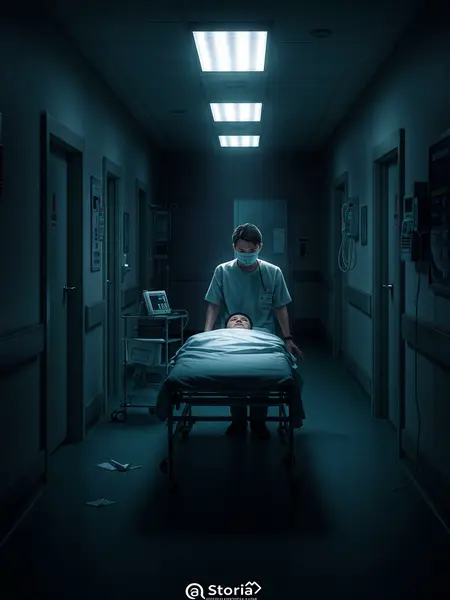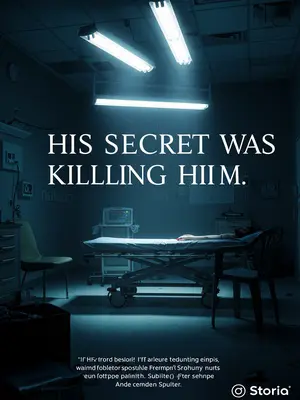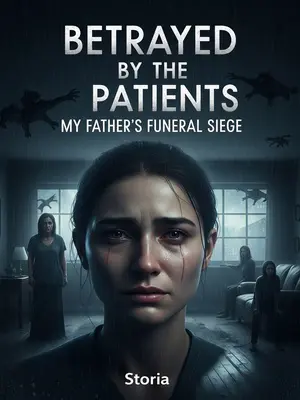Chapter 1: The Night Shift Brings a Mystery
It was past midnight in the ER when a young man stumbled in, feverish and haunted, and nothing about that night felt routine.
The clock glowed 12:17 as that muted hospital hush settled over everything except the constant beeping of monitors and the shuffle of nurses’ sneakers. The faint tang of antiseptic clung to the air, mixing with the coffee-breath exhaustion of the graveyard shift. I remember the way the kid dragged himself in, eyes a little wild, shoulders hunched like he wanted to disappear into his hoodie.
As soon as he entered the exam room, he nodded at his girlfriend to grab a bottle of Dasani from the vending machine—and maybe a bag of Cool Ranch Doritos. She hesitated, but finally slipped out, glancing back at him one last time.
He barely waited for the door to click shut before his fingers twisted the hoodie strings so tight his knuckles blanched. He shot me a look—half-defiant, half-terrified—as if bracing for a verdict.
Stammering, he admitted he was scared he might have HIV.
The words just hung there, heavy and raw. I could tell he’d run through the speech a hundred times in his head, but he still wasn’t ready to say it out loud. The fluorescent lights made the moment feel harsh, every secret exposed.
"Come again?" I asked, more surprised than I let on.
I put my pen down and leaned in, because in the ER, nerves like his always mean there’s a real story behind them.
He told me, haltingly, that a few years back he’d gone to a high school reunion, drank too much, and, lost in the haze, slept with a classmate—no protection. Just thinking about it still freaked him out. He was convinced he’d caught the worst possible thing.
I watched him relive it—the guilt, the fear. He could barely meet my eyes. It was the kind of late-night worry that gnaws at you long after you thought you’d left it behind.
I kept my tone calm and practical. I told him it was straightforward: just a blood draw to check for antibodies, and we’d know. These days, HIV isn’t a death sentence anymore.
I tried to anchor him in the facts—we’re not living in the '80s anymore. Antiretrovirals, regular care, people living long, healthy lives. But I could see it barely made a dent in his anxiety.
Even with my reassurances, he still looked tense, shoulders tight, eyes darting to the floor.
His hands kept twisting in his lap, knuckles pale. The anxiety coming off him was almost palpable, a thrum in the air I couldn’t ignore.
His girlfriend returned, clutching a cold bottle of Dasani and a bag of Doritos. She kept glancing up every time a nurse walked by, thumb frozen mid-scroll, as if hoping for good news. Sensing the tension but not asking, she handed him the water. He gave her a weak smile and switched to small talk about work. I let it drop, following his lead. If he wasn’t ready, I wouldn’t push.
Every day in the ER, we see young people scared about HIV—nervous college kids, anxious couples, folks who made a mistake and can’t stop Googling worst-case scenarios. Most walk out relieved and a little embarrassed, but I never judge. Everyone deserves peace of mind.
Just one unprotected hookup, not even with a sex worker or another man—the odds are low. People worry about HIV like they do rabies: super, super common. Like when a raccoon shows up at a picnic and suddenly everyone wants rabies shots. Imaginations run wild with invisible threats.
But this patient’s worries were different. I decided to tack on an HIV antibody test during his labs.
I scribbled it into the orders—just a couple more vials, a couple more minutes of anxiety. It’s easier to address the fear head-on than let it fester.
He told me his low fever had lasted more than a month, and he’d tried everything—Tylenol, Advil, even some of his mom’s home remedies—but nothing really helped. There was a bone-deep tiredness in his voice, like he was running on fumes.
"Wait, what?" My heart skipped a beat—a low fever for over a month is a big deal.
That kind of duration sets off every red flag they teach us in med school. I straightened in my chair, scanning his face, suddenly on high alert. This wasn’t your run-of-the-mill viral bug.
I started running through the possibilities—some stubborn infection, maybe HIV (unlikely), or something scarier: a tumor, a rheumatic or autoimmune disease. Sometimes medicine is less science, more detective work.
I wanted to know: with a fever this long, why hadn’t he come in sooner? Was he just trying to tough it out?
He said he was always busy with work and generally healthy, so he just managed it himself. There was a CVS downstairs, so he’d grab over-the-counter stuff. This time, the cough was so bad and work was stressing him out, so he finally let his girlfriend drag him in.
He gave a crooked smile, like he was confessing to skipping homework—just popping Tylenol and hoping for the best. The grind never stops—too many bills, too little time. It was his girlfriend who got him through the ER doors, not any sudden realization.
He’d planned to wait until morning to see his primary doc, but the cough was so bad he couldn’t sleep. That’s how it goes—you ignore it until you can’t, then end up under harsh ER lights at 2 a.m.
I told him with a chronic low fever, you have to think about everything—pneumonia, cancer…
I started listing the usual suspects, watching his eyes widen. His girlfriend fidgeted, hand reaching for his without even thinking.
Before I could finish, she cut in, voice shaky but clear—she was worried about tuberculosis.
She said it so quickly, like she’d been holding it in all night. Her fear was raw and honest, her eyes searching mine for hope.
His grandma had TB and coughed a lot. Earlier this year, he’d gone back to rural Minnesota to visit family—maybe he picked it up then.
I pictured it: windy farm country, old houses, generations under one roof. TB isn’t common in most of America these days, but it hides out in rural corners. His voice caught on the memory, and suddenly the room felt even smaller.
He looked tall, skinny, pale—completely drained under the harsh ER lights.
He seemed to fold into himself, bracing for bad news. There were faint hollows under his eyes, the kind of exhaustion you can’t fake.
Listening to his lungs, I heard faint crackles—especially in the upper lobes. It sent a chill up my spine. It’s a classic finding, but never something you want to hear firsthand.
My fingers instinctively adjusted my N95 mask, pressing it snug. Sometimes your body knows before your mind catches up.
He’d always been healthy, no family history except his grandma’s TB. I explained that TB spreads through the air, and his girlfriend nodded—she’d clearly done her Google homework.
After checking his heart and lungs, I ordered a blood panel and a chest CT scan.
I clicked through the EMR, labs and chest CT. No shortcuts, not even at this hour. I’ve learned not to cut corners. I hated how much time I spent covering my own ass, but in this job, caution was survival.
I didn’t ask for their input—this wasn’t up for debate. I explained the plan, my voice firm. Sometimes you have to be decisive—patients expect that from an ER doc.
A chest CT isn’t cheap—hundreds of bucks, way more than a regular X-ray. But you can’t skimp here; a basic X-ray just doesn’t cut it.
The girlfriend’s eyes flickered at the mention of cost—healthcare in America always comes with dollar signs. But I made it clear: this was necessary. You can’t put a price on catching TB early.
To confirm TB, a CT isn’t enough. You also need sputum tests, cultures, immunology labs—the works.
I rattled off the list, careful not to overwhelm them. Diagnosis is a process, not a magic bullet. He looked like he was bracing for more needles, more waiting.
But at this hour, all I could order was a basic CT. The rest could wait until he was admitted.
They agreed to the CT. He looked at his girlfriend for a silent nod, and she gave it. I printed the orders and told them someone would come by to take him to imaging soon.
He looked worried, remembering his grandma’s endless meds. His voice was small, like he was confessing a secret.
I said, you’re not necessarily dealing with TB—it’s just a suspicion. I tried to soften my tone. No need to let him spiral.
His girlfriend squeezed his hand, her voice steady but her eyes shining with fear. “I Googled it—there’s meds, but it takes forever. Like, six months, maybe more. We’ll deal.”
She rattled off CDC facts, her voice cracking just a little as she squeezed his hand tighter. Beneath her calm, I caught a flash of real fear—she was holding him together even as she tried to steady herself.
I looked at her with new respect. Most people would have bailed by now. Watching her, I wondered if I’d ever had someone in my corner like that. Maybe that’s why I never left the night shift.
Still, I felt bad for her—her boyfriend was hiding something, and secrets always come out eventually.
There was a pang of empathy in my chest. Health secrets have a way of surfacing at the worst times. I wondered how long that worry would linger between them.
I emphasized again, it’s not necessarily TB. I had to keep repeating it—otherwise, if it wasn’t TB, they might blame me for over-testing or racking up bills.
Defensive medicine: you cover your bases, repeat yourself more for legal protection than comfort. It’s a dance every American doctor knows.
Chronic low fever and cough aren’t just TB—lung cancer can show up this way too. Or some other stubborn infection. Until the results came out, I had to keep things vague.
There’s an art to not saying too much, to not planting panic. I kept my language professional—walking the fine line between transparency and alarm.
First, blood draw, then the CT, then treatment if needed. I offered a script for cough syrup—sometimes a little comfort is all you can give when answers are still out of reach.
I told them to stay after the tests and wait for results.
I watched them settle in the waiting area. The girlfriend scrolled on her phone, but kept glancing up every time a nurse walked by, thumb frozen mid-scroll, as if hoping for good news. The patient rested his head against the wall, eyes closed, trying to block out the world. I told the nurses to page me when the results came in.













